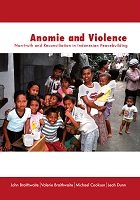Anomie and Violence
Non-truth and reconciliation in Indonesian peacebuilding
| dc.contributor.author | Braithwaite, John | |
| dc.contributor.author | Braithwaite, Valerie | |
| dc.contributor.author | Cookson, Michael | |
| dc.contributor.author | Dunn, Leah | |
| dc.date.accessioned | 2013-11-05 00:00:00 | |
| dc.date.accessioned | 2020-04-01T14:57:07Z | |
| dc.date.available | 2020-04-01T14:57:07Z | |
| dc.date.issued | 2010 | |
| dc.identifier | 458801 | |
| dc.identifier | OCN: 516510060 | en_US |
| dc.identifier.uri | http://library.oapen.org/handle/20.500.12657/33823 | |
| dc.description.abstract | Indonesia suffered an explosion of religious violence, ethnic violence, separatist violence, terrorism, and violence by criminal gangs, the security forces and militias in the late 1990s and early 2000s. By 2002 Indonesia had the worst terrorism problem of any nation. All these forms of violence have now fallen dramatically. How was this accomplished? What drove the rise and the fall of violence? Anomie theory is deployed to explain these developments. Sudden institutional change at the time of the Asian financial crisis and the fall of President Suharto meant the rules of the game were up for grabs. Valerie Braithwaite’s motivational postures theory is used to explain the gaming of the rules and the disengagement from authority that occurred in that era. Ultimately resistance to Suharto laid a foundation for commitment to a revised, more democratic, institutional order. The peacebuilding that occurred was not based on the high-integrity truth-seeking and reconciliation that was the normative preference of these authors. Rather it was based on non-truth, sometimes lies, and yet substantial reconciliation. This poses a challenge to restorative justice theories of peacebuilding. | |
| dc.language | English | |
| dc.subject.classification | thema EDItEUR::J Society and Social Sciences::JP Politics and government | en_US |
| dc.subject.other | politics and government | |
| dc.subject.other | conflictmanagement | |
| dc.subject.other | social conditions | |
| dc.subject.other | social conflict | |
| dc.subject.other | indonesia | |
| dc.subject.other | political violence | |
| dc.subject.other | Aceh | |
| dc.subject.other | Dayak people | |
| dc.subject.other | Indigenous people of New Guinea | |
| dc.subject.other | Madurese people | |
| dc.subject.other | Maluku Islands | |
| dc.subject.other | Papua (province) | |
| dc.title | Anomie and Violence | |
| dc.title.alternative | Non-truth and reconciliation in Indonesian peacebuilding | |
| dc.type | book | |
| oapen.identifier.doi | 10.26530/OAPEN_458801 | |
| oapen.relation.isPublishedBy | ddc8cc3f-dd57-40ef-b8d5-06f839686b71 | |
| oapen.relation.isbn | 9781921666230 | |
| oapen.pages | 501 | |
| oapen.place.publication | Canberra | |
| oapen.remark.public | Relevant Wikipedia pages: Aceh - https://en.wikipedia.org/wiki/Aceh; Dayak people - https://en.wikipedia.org/wiki/Dayak_people; Indigenous people of New Guinea - https://en.wikipedia.org/wiki/Indigenous_people_of_New_Guinea; Indonesia - https://en.wikipedia.org/wiki/Indonesia; Indonesian language - https://en.wikipedia.org/wiki/Indonesian_language; Madurese people - https://en.wikipedia.org/wiki/Madurese_people; Maluku Islands - https://en.wikipedia.org/wiki/Maluku_Islands; Papua (province) - https://en.wikipedia.org/wiki/Papua_(province) | |
| oapen.identifier.ocn | 516510060 |

